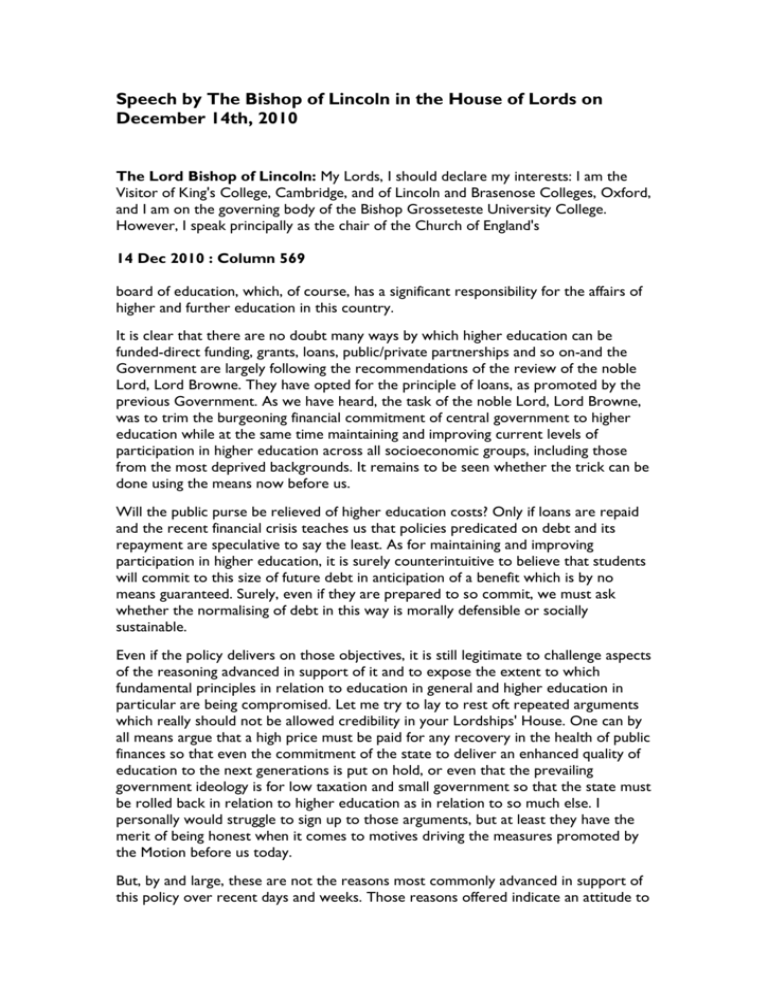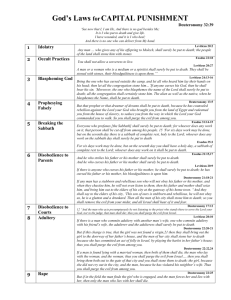The Lord Bishop of Lincoln: My Lords, I should declare my interests
advertisement

Speech by The Bishop of Lincoln in the House of Lords on December 14th, 2010 The Lord Bishop of Lincoln: My Lords, I should declare my interests: I am the Visitor of King's College, Cambridge, and of Lincoln and Brasenose Colleges, Oxford, and I am on the governing body of the Bishop Grosseteste University College. However, I speak principally as the chair of the Church of England's 14 Dec 2010 : Column 569 board of education, which, of course, has a significant responsibility for the affairs of higher and further education in this country. It is clear that there are no doubt many ways by which higher education can be funded-direct funding, grants, loans, public/private partnerships and so on-and the Government are largely following the recommendations of the review of the noble Lord, Lord Browne. They have opted for the principle of loans, as promoted by the previous Government. As we have heard, the task of the noble Lord, Lord Browne, was to trim the burgeoning financial commitment of central government to higher education while at the same time maintaining and improving current levels of participation in higher education across all socioeconomic groups, including those from the most deprived backgrounds. It remains to be seen whether the trick can be done using the means now before us. Will the public purse be relieved of higher education costs? Only if loans are repaid and the recent financial crisis teaches us that policies predicated on debt and its repayment are speculative to say the least. As for maintaining and improving participation in higher education, it is surely counterintuitive to believe that students will commit to this size of future debt in anticipation of a benefit which is by no means guaranteed. Surely, even if they are prepared to so commit, we must ask whether the normalising of debt in this way is morally defensible or socially sustainable. Even if the policy delivers on those objectives, it is still legitimate to challenge aspects of the reasoning advanced in support of it and to expose the extent to which fundamental principles in relation to education in general and higher education in particular are being compromised. Let me try to lay to rest oft repeated arguments which really should not be allowed credibility in your Lordships' House. One can by all means argue that a high price must be paid for any recovery in the health of public finances so that even the commitment of the state to deliver an enhanced quality of education to the next generations is put on hold, or even that the prevailing government ideology is for low taxation and small government so that the state must be rolled back in relation to higher education as in relation to so much else. I personally would struggle to sign up to those arguments, but at least they have the merit of being honest when it comes to motives driving the measures promoted by the Motion before us today. But, by and large, these are not the reasons most commonly advanced in support of this policy over recent days and weeks. Those reasons offered indicate an attitude to higher education which is radically different-the phrase "game-changer" has been used-from anything that we have known before and is deeply troubling to those of us who see education as a key component in human flourishing; that life in all its fullness which Jesus came to bring. We hear it argued that it is the individual student who benefits from higher education, so it is reasonable for the student to pay, albeit not up front-thank goodness-but eventually, through a repayment of loans. But that flies in the face of everything that we believe and cherish when it comes to what higher 14 Dec 2010 : Column 570 education is all about and why it matters. Surely it is for the sake of the common good that the state uses taxpayers' money to fund higher education, because that is precisely what a progressive taxation system is designed to deliver. It is the mechanism whereby the common purse funds what is for the common good. Even John Stuart Mill in his distinctly small- government manifesto, Principles of Political Economy, asserts that education, "is one of those things which it is admissible in principle that a government should provide for the people". It is a masterly understatement if ever there was one. So let us hear no more of this idea that higher education is a privatised commodity to be bought and sold on the open market. That leads on to a further point. John Stuart Mill also said: "In the matter of education, the intervention of government is justifiable, because the case is not one which the interest and judgment of the consumer are a sufficient security for the goodness of the commodity". So let us hear no more about the choices of the student determining which courses will and will not be on offer in the higher education sector. No Government can abdicate their responsibility to plan for the development of such knowledge, skills and aptitudes as will be necessary for the future well-being of the nation and its people. Students can certainly exercise influence to drive up standards by having a choice as to which courses on offer they are minded to pursue and where. But the free-market model cannot extend to them determining by their choices whether certain subjects or courses will continue to be taught at all. I may well derive some satisfaction from all students opting to study theology, but I rather think that sufficient numbers of students studying engineering, medicine, English literature, foreign languages and so on to a high standard would be a good and necessary thing, and only Governments governing can ensure that balance for the common good. 6.15 pm Here, a further fallacious argument needs to be examined: the idea that certain subjects should attract government funding while others, especially those associated with the humanities and social sciences, should not. It is argued that all subjects will be funded equally from tuition fees, and then additional funding will be available for those courses utilising expensive laboratory and other infrastructure facilities. But, as I understand it, it has already been conceded that study of foreign languages should be grant-aided over and above the tuition fee. So what about the humanities and social sciences, which are vital to the development of rounded human beings rather than mere economic units? Surely the Government do not subscribe to the view that higher education is essentially about economic rather than human development-that most crass form of instrumentalism which I have to say to the dismay of some others in the House seemed to lurk around the corridors of power during the dying days of the previous Administration. But reasoning advanced in support of current policies seems by implication to reinforce that instrumentalist approach to higher education, so it needs to be said yet again that human development is about history, geography, philosophy 14 Dec 2010 : Column 571 and theology as much as it is about physics, chemistry and applied mathematics. Can we hear no more about the state needing to fund only courses which are believed to prepare people for work and serve the economy? Joanna Bourke of Birkbeck College recently referred to this stance as, "vulnerable to the swaggering philistinism of management science". Perhaps I would not put it quite that way myself-although on further thought, perhaps I would. What we need to challenge in relation to this legislation is, first, the elevation of individual benefit over the claims of the common good; secondly, education as a commodity subject to the vagaries of market forces, when it is truly to be for the common good-in relation to higher education, the individual student may not always know what is best for the good of all; and, thirdly, the need for higher education to celebrate and resource the widest range of subjects if graduates are to emerge as fully rounded human beings. That was precisely why our forefathers endowed universities and, in this regard at least, their wisdom has not been eroded by the passage of time. If we are all in it together, it would appear that this and subsequent generations of students will be in it more than most. It is an issue of justice when some of the poorest young people in our society are deterred from contributing through further and higher education to the common good of all by withdrawal of, as has been referred to, the education maintenance allowances for further education and, as is the subject of this debate, the hiking of tuition fees to pay for a higher education. For all these reasons, this proposed way forward for the funding of higher education in this country is deeply flawed. The long-term costs of such a short-term gain are hardly to be countenanced, even in the most straitened of financial circumstances. http://www.publications.parliament.uk/pa/ld201011/ldhansrd/text/101214-0002.htm











